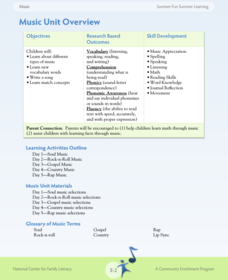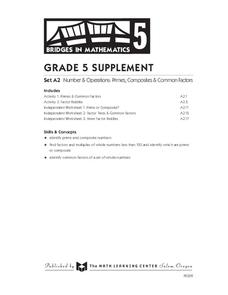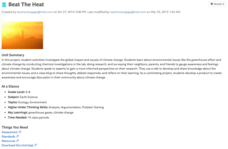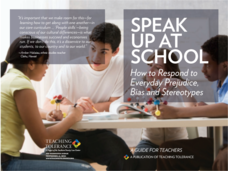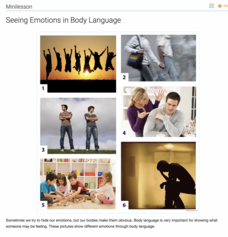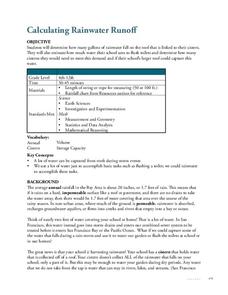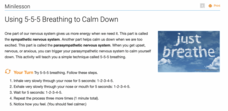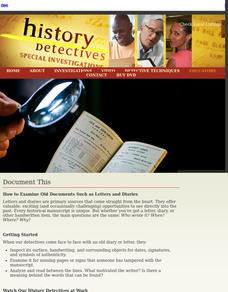National Center for Families Learning
The Summer Fun Summer Learning Music Unit
Take note. Soul music. Gospel music. Country music. Summer comes alive with the sounds of music as program participants learn about various genres of music, create instruments, and write and perform songs about the facts and traditions...
Math Learning Center
Grade 5 Supplement Set A2 – Number and Operations: Primes, Composites and Common Factors
Incorporate riddles into your math lesson by having students make tree factors and determine if the number is a prime or composite. They will also use other clues to find the answer to the riddle while sharpening their...
Intel
Beat the Heat
Explore greenhouse effect and climate change through a 15-day unit. Scholars learn about these STEM concepts by researching, conducting surveys, experimenting, and collaborating with experts in the field. They frequently communicate...
American Museum of Natural History
What is Marine Biology?
A marine environment covers the majority of the earth but is arguably the least understood. Teach young scientists about the characteristics of oceans and ocean species using an interactive online lesson. The in-person or remote learning...
Southern Poverty Law Center
Speak Up at School
When someone says something offensive based on prejudice or a stereotype, it's often difficult to know how to react. A packet on tolerance and standing up for others guides teachers to both learn and instruct members of their class to...
Science Geek
Build a Food Web Activity
Entangle your life science class in learning with this collaborative food web activity. Using pictures of the plants and animals native to a particular ecosystem, young biologists work in small groups to construct visual...
Thoughtful Learning
Seeing Emotions in Body Language
Scholars test their skills of reading body language with a collaborative learning experience that focuses on showing and identifying emotions. Pairs take turns acting out an emotion, one uses body language while the other guesses what...
Core Knowledge Foundation
A “Whole” Lot of Fraction Fun!
Young mathematicians are introduced to fractions in a unit that helps them to understand parts of a whole.
Techbridge Curriculum
Calculating Rainwater Runoff
Thirsty plants soak up every bit of a rainfall, but what happens to the rain that hits the roof? Calculate the amount of rainwater from your school's roof with an Earth science activity, which brings measurement skills, observation...
Thoughtful Learning
Using Positive Self-Talk
Boost positive self-talk with a chart that turns negative feelings into happy ones. Scholars write down their negative emotions then rewrite them with a positive flair to aid in changing their outlook.
Thoughtful Learning
Using 5-5-5 Breathing to Calm Down
Scholars calm their minds and bodies with a 5-5-5 breathing exercise. Learners breathe in for five seconds, out for five seconds, then wait five seconds to start again. The exercise takes one minute to complete.
Tennessee Valley Authority
Renewable Energy Sources
Not all energy sources are renewable, as learners investigate in this unit. Made up of six lessons that span a few weeks of instruction, the unit has learners examining US energy reserves and consumption, using data to draw conclusions...
King Country
Lesson 4: Relationships - Day 2: Gender Identification
Gender roles and gender identity are the focus of a lesson designed for high school special education classes. Read the introduction to the packet carefully, as it contains advice about how to approach the subject with your...
Indiana Department of Education
Social Emotional Learning Competencies PK-12 Lesson Plans
Looking for lesson plans that address social and emotional learning competencies? Here's help in the form of a 166-page packet that includes lesson plans for elementary, middle, and high school learners. Seven detailed plans are provided...
PBS
Document This
Being a historian requires serious sleuthing. They examine primary source documents and look for evidence, for clues that reveal who wrote the document, when, and why. After watching two historians model the process, young history...
K12 Reader
Branches of Government
Set down the basics of the three branches of government with the reading passage included here. After reading, class members answer five questions related to the passage.
Curated OER
By the People for the People
Students explore, using discussion, writing, and data collection, how different social factors affect civic participation and equality across the country and in their own school community.
Curated OER
Lesson 8-The Changing Environment: Good or Bad?
Second graders, after listening to "A River Ran Wild," explore all the ways the natural environment has changed and how it affects the community and the people who reside within it. They collect data by interviewing a community member,...
Curated OER
If I Had A Million Dollars
Students write a persuasive letter. In this philanthropy lesson, students write about what they would do if they had a million dollars. They discuss worthwhile community causes they could donate money to. Students also research...
Curated OER
Timber Harvesting: A Civic Debate
Eighth graders analyze and identify the importance of our forests and how to manage them properly. In this tree lesson students read forestry material and come up with different alternatives to the identified problems.
Curated OER
Historical Figures
Second graders identify a historical figure, his or her societal contributions and basic biography using a Kidspiration graphic organizer and library resources. They use the Internet to conduct an historical treasure hunt in groups.
Curated OER
Our Changing Voices
Twelfth graders examine their role in society. They search primary documents and assemble a family album.
Curated OER
Killer Coal
Young scholars explore some of the environmental health risks involved with both the mining and burning of coal. They read articles on coal in the Balkan Peninsula, view the photographs, and then discuss what feelings and thoughts they...
Curated OER
Community Action
Fifth graders brainstorm a list of decisions that students make daily that affect the welfare of the environment categorizing them as being either helpful or harmful. They then trace local actions to distant consequences to determine how...
